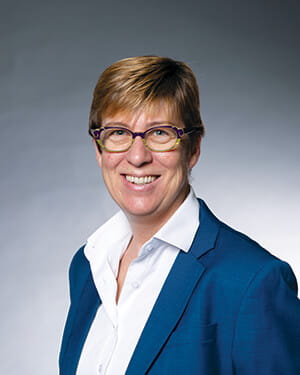
Sue Subocz’s path to her role as Walden’s chief academic officer and provost began, coincidentally, with an experience as a distance education student. In 1998, as an active-duty member of the United States Coast Guard, she enrolled in a history of education course by mailing in a postcard to a midwestern university’s extension program. In return, the institution sent her a big box of materials, which she reviewed, completed, and returned to be graded.
Distance education has changed drastically in the 22 years since, and Subocz has spent most of that time at the field’s cutting edge as a faculty member and administrator. Subocz most recently served as Walden University’s vice provost for curriculum, product strategy, innovation, and design. She formerly served as vice president of product strategy, innovation, and design for Walden’s parent company, Laureate Education, where she improved student engagement with leading innovative digital product design and quality program development.
Currently, Subocz provides leadership in a broad academic capacity that encompasses ensuring the academic integrity of the university, overseeing long-range planning and budgeting, and steering curriculum and program development. Her focus is on delivering high-quality curricula and programs that meet the needs of students, align with the Walden mission, and comply with various accreditation agencies and state regulations. In the following interview, Subocz shares how she went from military engineer to university administrator, and why she’s grateful that her career path led her to Walden.
Why did you want to pursue a career in education?I love school, I love learning, and I always have. The minute I graduated from the [U.S.] Coast Guard Academy, I made it my goal to go back and teach there. I got to a point in my military career that I knew I wasn’t going to have the opportunity to do that, but I said, “I’ll give teaching a shot anyway.” I thought I’d be a high school teacher—there was a program called Troops to Teachers that made it easier to transition from military to civilian life. I wanted to take classes for free at the community college, then become a high school teacher, so I became an adjunct professor. As I taught (at the community college), I thought, “Why should I teach high school when I could teach college?”
How did you decide to specialize in instructional design?
As I finished my master’s in education and started my PhD program, it just so happened that at the same time, online learning was really starting to ramp up. My technical interest combined with all of that, and I did my doctoral degree in instructional design for online learning. That launched into an administrative career as an instructional designer and administrator. It all just kind of happened. I never had a goal to do it, but my take is that you do everything as well as you can while you’re there and see what’s next. And what came next was this.
How did you find your way to Walden?
Someone I’d worked with at the community college recommended the job. I knew of Walden from my time as a student at Capella [University]. I chose Capella at the time because they had a great offer going for military people, but Walden stood out as one of the good guys in the for-profit industry along with Capella. Comparing my educational experiences, I worked harder in my PhD and master’s programs at Capella than I ever did at my on-ground alma maters. People doubt the for-profits, especially if you’ve been with public universities. But it didn’t even occur to me. I knew I had a great education at Capella, and Walden compared to it. When the opportunity came up in my networking, I didn’t think twice about it.
What have you enjoyed most about working at Walden?
If there’s one thing we’re all learning right now through this COVID-19 situation, it’s that the forces of change in the world are coming from everywhere, and you never know what the next one is going to be. It’s a great time to be at an organization that believes in innovation, isn’t afraid to pivot quickly, has such great internal talent, and cares so much about its students. We moved a residency from face-to-face to virtual in just two days. I don’t know who else could have done that. And it went great—most students decided to participate in the virtual format [versus postponing until a later date]. The faculty were so willing to change and respond. We had to train faculty to use Zoom and practice virtual teaching skills, and they jumped right into it. There’s a mindset at Walden that not every higher education [institution] is prepared to have.
What makes you proudest about your association with Walden?
Our commitment to our learners and their employment outcomes. It’s not just about getting a piece of paper, it’s about getting a piece of paper that can change your place in the world. We create an avenue for people to create their own change, for themselves and their communities. We create social change with every graduate. They’re out there changing their own place in the world, in the lives of their families and those they work with, and in creating inspiration for those around them.



